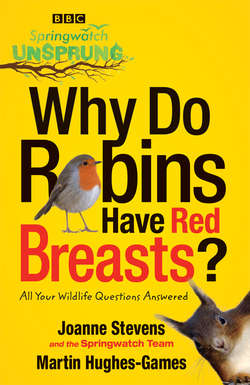Читать книгу Springwatch Unsprung: Why Do Robins Have Red Breasts? - Jo Stevens - Страница 8
Flying the Nest
ОглавлениеWhat happens to fledglings during their first few nights in the big world? Do the parents stay close by or do they call throughout the night as reassurance to the young? Or, apart from feeding, are the young basically alone? Tony from Gloucester
When fledglings leave the nest, am I right in assuming they never return to it? In which case, where do they spend their first night outdoors? I know that the nests get quite dirty and parasite-ridden, but even so it seems awfully harsh that they spend all their young lives in the safety of a warm nest and then – BAM! – just like that they’re out on their own, never to return? Kate
How ‘capable’ should blue tits be when they fledge? I have a blue tit nest in the vent of an extractor fan and the three young left the nest two days ago. They were feathery but barely able to toddle, let alone fly, and showed no inclination at all to seek shelter or move away from a potential predator – me. Five hours later, when almost fully dark, two were still sitting out in the open on my doorstep cheeping loudly. I haven’t seen them since, dead or alive, but they didn’t look like survivors. Did they jump too soon, or are blue tit babies always like this? Stocksfield
Leaving the nest is one of the most dangerous times in a bird’s life. Fledglings need to learn fast; they have to work out how to fly, find their own food and avoid becoming someone else’s dinner. Mortality is high and many blue tit chicks don’t make it – only 38 per cent live for over a year. This is why blue tits lay so many eggs in a clutch (usually 8–10 but up to 16), to increase the chances of at least some of them living to adulthood.
Once chicks of garden birds leave the nest, they rarely return. As Kate points out, the nest is pretty smelly after having a growing family squeezed into it for a while, with droppings and food remains building up. That scent can attract predators. Instead, it is safer for chicks to leave the nest and venture out into the big wide world.
Many garden birds fledge just before they can fly and blackbird chicks leave the nest two or three days before they can take to the air. Fledglings often split up and hide in inconspicuous places, waiting to be fed by their parents. From the parents’ point of view, it’s safer to split up their offspring around a garden than risk keeping them together where, if found, all the chicks may be taken. Blue tit parents encourage their chicks to leave the nest by enticing them with food and calling to them. Those blue tits chirping on the doorstep were certainly in a risky position, as usually parents would guide their youngsters to a safe place.
If you do find an apparently abandoned chick, don’t be tempted to ‘save’ it too hastily. Instead, try leaving it alone and watch from a distance unless it is in immediate danger or very exposed, in which case move it quickly and gently into some cover, like a bush. The parents are probably nearby and will return to look after it when the coast is clear. Fledgling blue tits usually stay with their parents for a couple of weeks, relying on them for food initially while they learn how to be a blue tit and fend for themselves.
